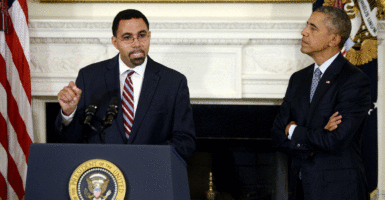During one of his final weeks on the job, President Barack Obama’s secretary of education called for education leaders to unite around support for charter schools.
“If we believe that public schools will always be the bedrock of American democracy and opportunity—as I do—we should welcome good public charter schools as laboratories for innovation that can benefit all of education,” Secretary of Education John King said at an event Wednesday hosted by the Center for American Progress in Washington, D.C.
“Now is the moment to set aside policy differences that divide us,” he added.
Since their inception more than two decades ago, charter schools have been a major point of contention between politicians, educators, policy experts, special-interest groups, and others.
In recent weeks, liberals have attacked President-elect Donald Trump’s pick for education secretary, Betsy DeVos, for her support of charter schools. DeVos played a major role advancing charter schools in Michigan since the 1990s and encouraged her husband to start a charter school in Grand Rapids.
“Charter schools are another choice—a very valid choice,” DeVos said in a 2013 interview with Philanthropy magazine. “As we work to help provide parents with more educational choices, it is always with the assumption that charter schools are part of the equation.”
Charter schools are public schools that are open and free to all students. They operate with a mix of local, state, and federal funding, based on student enrollment.
In exchange for more freedom to be innovative with decisions involving curriculum, culture, budgeting, hiring, and firing, charter schools are held to a greater accountability for performance.
Instead of being managed by a traditional school board, the majority of charter schools are run by a nonprofit, while 13 percent are managed by a for-profit company.
Recently, they’ve come under increased attack by civil rights groups including the National Association for the Advancement of Colored People and Black Lives Matter, who see them as part of a greater attempt to privatize public education.
In October, the NAACP called for an immediate moratorium on charter school expansion, arguing that charter schools divert money at the expense of public schools and don’t have to abide by the same level of transparency and accountability standards as public schools.
King, however, called the fight between charter and public schools “a false choice.”
“Let’s also resist a false choice between allowing public charter schools and supporting traditional district public schools,” he said, adding:
Our primary concern shouldn’t be the management structure of schools, it should be whether schools serve all students well. Some of the best schools in places like Newark, Los Angeles, and the Rio Grande Valley are public charter schools that are closing achievement gaps and preparing graduates to finish college.
Instead of fighting, King said traditional public schools and charter schools should join forces.
Already, he added, this is happening in some parts of the country, where charters and district schools are forming partnerships, “allowing them to learn and be inspired by one another.”
Charter schools in many urban areas have shown a remarkable ability to outperform traditional public schools and close the achievement gap between white and black students. But not every charter school succeeds, and for those that don’t, King said, they must be shut down.
“Supporters of public charter schools, myself included, must recognize the grave threat that ineffective charter schools pose to the entire sector. We must demand that charter authorizers set a high bar for granting a charter, rigorously monitor the academic and performance of charters, and close failing schools,” he said.
Just as important of a task, he added, is turning around ineffective district schools.
We must be equally rigorous in monitoring the performance and working to turn around the performance of ineffective district schools. Supporting public charter schools and supporting district schools means demanding quality for both.
King was born in Brooklyn to African-American and Puerto Rican parents who both died before he was even a teen. He has credited his teachers in New York City with stepping in and helping him succeed.
Before working under Obama at the Department of Education, King was heavily involved in the charter school world, having co-founded Roxbury Prep in Boston and Uncommon Schools, which now has nearly 50 charter schools in six regions.
Instead of attacking charter schools, King said, “We’ve got to lift up examples of schools that are doing the right thing … and say that’s where we need the charter sector to go.”






























